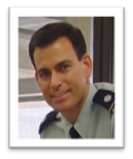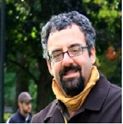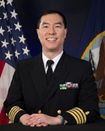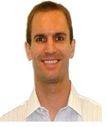Advances in Military and Veteran Health Research from Post-911 Conflicts Biography Information

Course Directors
 | RORY A. COOPER, PhD Contact Information |
Rory A. Cooper, PhD received the BS and MEng degrees in electrical engineering for California Polytechnic State University, San Luis Obispo in 1985 and 1986, respectively. He received the Ph.D. degree in electrical and computer engineering with a concentration in bioengineering from University of California at Santa Barbara in 1989. He is FISA & Paralyzed Veterans of America (PVA) Chair and Distinguished Professor of the Department of Rehabilitation Science and Technology, and professor of Bioengineering, Mechanical Engineering, Physical Medicine & Rehab, and Orthopedic Surgery at the University of Pittsburgh. Dr. Cooper is Founding Director and VA Senior Research Career Scientist of the VA Rehabilitation Research and Development Center of Excellence in Pittsburgh. He is also the Co-Director of the NSF Quality of Life Technology Engineering Research Center, a joint effort between the University of Pittsburgh and Carnegie Mellon University. He is the Editor of the journal Assistive Technology and the AT Research Book Series of IOS Press. Dr. Cooper serves or has served on the editorial boards of several prominent peer-reviewed journals in the fields of rehabilitation and bioengineering. He has received multiple prestigious awards to include the Olin Teague Award, Paul Magnuson Award, U.S. Army Outstanding Civilian Service Medal, James Peters Award, Maxwell J. Schleifer Award,DaVinci Lifetime Achievement Award, Veteran’s Leadership Program Veteran of the Year, and a member of the inaugural class of the Spinal Cord Injury Hall of Fame. Dr. Cooper has authored or co-authored over 200 peer-reviewed journal publications. He has ten patents awarded or pending. Dr. Cooper is the author of two books: Rehabilitation Engineering Applied to Mobility and Manipulation and Wheelchair Selection and Configuration, and co-editor of An Introduction to Rehabilitation Engineering, Care of the Combat Amputee, and the Warrior Transition Leader Medical Rehabilitation Handbook. Dr. Cooper is an elected Fellow of the Rehabilitation Engineering and Assistive Technology Society of North America (RESNA), the Institute of Electrical and Electronics Engineers (IEEE), the American Institute of Medical and Biological Engineering (AIMBE), and the Biomedical Engineering Society (BMES). Dr. Cooper has been an invited lecturer at many institutions around the world, for example the National Academies of Sciences Distinctive Voices Lecture, and was awarded Honorary Professor at The Hong Kong Polytechnic University and Xi’an Jiatong University. He has also been elected to Eta Kappa Nu, Tau Beta Pi, and Sigma Xi honorary societies. Dr. Cooper is a former President of RESNA, and a member of the RESNA/ANSI and ISO Wheelchair Standards Committees, and IEEE-EMBS Medical Device Standards Committee. In 1988, he was a bronze medalist in the Paralympic Games, Seoul, Republic of Korea. He was on the steering committee for the 1996 Paralympic Scientific Congress held in Atlanta, GA, and the Sports Scientist for the 2008 U.S. Paralympic Team in Beijing, China. In 2009, Dr. Cooper was featured on a Cheerios cereal box for his many achievements. He has been a member of the U.S. Centers for Medicare and Medicaid Services – Medicare Advisory Committee, Steering Committee of the Academy of PM&R on Research Capacity Building. and Chair of the National Advisory Board on Medical Rehabilitation Research, National Institute of Child Health & Human Development, and National Academy of Sciences Keck Foundation Initiative on Human Health Span Steering Committee. Dr. Cooper is a U.S. Army veteran with a spinal cord injury and a Director of the Paralyzed Veterans of America Research Foundation. He currently serves as a member of the U.S. Secretary of Veterans Affairs Prosthetics & Special Disability Programs Advisory Committee, U.S. Department of Defense Health Board Subcommittee on Amputation and Orthopedics, and the Board of Directors of Easter Seals. Dr. Cooper has actively collaborated with the Indian Spinal Injuries Centre on increasing access to quality services and devices for people with disabilities in India and throughout developing countries. | |
 | PAUL F. PASQUINA, MD Colonel (RET), U.S. Army Medical Corps Contact Information
|
Paul F. Pasquina, M.D. is the Residency Director and Chair, Physical Medicine & Rehabilitation and Director of the Center for Rehabilitation Sciences Research at Uniformed Services University of the Health Sciences, Walter Reed National Military Medical Center. Dr. Pasquina retired from the United States Army Medical Corps in 2012 as Chief of the Department of Orthopaedics and Rehabilitation at Walter Reed National Military Medical Center and the Director of the Center for Rehabilitation Sciences Research (CRSR) at the Uniformed Services University of the Health Sciences (USUHS). He is a graduate of the United States Military Academy at West Point and USUHS. In addition to being board certified in Physical Medicine & Rehabilitation (PM&R), he is also board certified in Electrodiagnostic Medicine and Pain Medicine. He completed a fellowship in sports medicine and remains interested in all aspects of musculoskeletal medicine especially as it applies to individuals with disabilities. He is the specialty consultant to the Army Surgeon General for Physical Medicine & Rehabilitation and a Secretarial appointee on the Department of Veterans Affairs (VA) Advisory Committee for Prosthetics and Special Disabilities Programs. Dr. Pasquina has authored multiple book chapters, journal articles and policy papers. He has served as the PM&R Residency Program Director and Medical Advisor to the North Atlantic Regional Medical Command for quality healthcare. He has received multiple military awards, as well as awards for teaching and mentorship, including the U.S. Army’s “A” Proficiency Designation for academic excellence, the Order of Military Medical Merit, and Honorary Fellow of the Rehabilitation Engineering and Assistive Technology Society of North America (RESNA). | |
Guest Faculty and Presenters (Listed Alphabetically)
 | LYNDA DAVIS, PHD
|
Dr. Davis is a subject matter expert on Military, Veteran, Family (MVF), Caregiver & Survivor support through successful, sustainable services. Is currently working with the Department of Defense in the area of Tragedy Assistance Program for Survivors (TAPS) and Caring for Military Families, Elizabeth Dole Foundation. She was education at the University of Southern California. She is the former deputy undersecretary of defense for military community and family policy and former deputy assistant secretary of the Navy for manpower and personnel policy, to the position of senior vice president for defense and intelligence. Dr. Davis will discuss created the Caregiver Community Program and the grassroots effort to raise awareness of the challenges of military caregivers. She will discuss the various military program and explain how wounded warriors need the help of loved ones and dedicated caregivers, and those “hidden heroes” greatly assisted injured service members in need a hand. She will discuss the dedication of the caregivers and the programs available to assist. | |
 | LOUIS M. FRENCH, PSYD
|
Dr. French is the Deputy Director for Operations at the National Intrepid Center of Excellence (NICoE), Walter Reed National Military Medical Center (WRNMMC), where he participates in a diversified research portfolio. Dr. French is principal investigator on seven studies of TBI in returning service members, including the congressionally mandated, 15-year study of the natural history of TBI in military service members. He has published over 50 peer-reviewed journal articles and book chapters in the area of military TBI and neuropsychology. Dr. French served as Chief, Traumatic Brain Injury at Walter Reed Army Medical Center and at WRNMMC, prior to the integration of all TBI services on the WRNMMC campus in late 2014. He is chairman of the Joint Traumatic Brain Injury Task Force, which coordinates TBI care in the National Capitol Region Medical Directorate. He holds faculty positions in the Departments of Neurology and Rehabilitation at the Uniformed Services University of the Health Sciences. Dr. French received his doctorate in clinical psychology, focused on assessment, from the George Washington University. He completed fellowships in clinical and experimental neuropsychology at the National Institutes of Mental Health and in neuropsychology focusing on traumatic brain injury at the Defense and Veterans Brain Injury Center at Walter Reed Army Medical Center. Dr. French will discuss the current policy on screening and treatment for TBI on the battlefield and at home. He will provide the latest update on the federal panels and workgroups about TBI in the military, including the Army Surgeon General’s Taskforce on TBI, whose report provided the foundation for the structure of TBI screening and treatment that is currently in place in the DoD. | |
 | SETH MESSINGER, PHD
|
Dr. Messinger is the Director of Qualitative Research for the Center for Rehabilitation Sciences Research, CRSR. He is an Associate Professor for the Department of Sociology and Anthropology at the University of Maryland Baltimore County (UMBC) and an adjunct professor with the Uniformed Services University. Dr. Messinger earned his BA at the University of Connecticut, MA from New York University, and PhD from Columbia University. Dr. Messinger conducted his post-doc at Rutgers University. He is a subject matter expert in the area of social barriers to successful rehabilitation and reintegration. He has published numerous articles on the subject. Dr. Messinger will discuss the fact that 1,500 US service members have sustained the loss of one or more limbs while deployed to Afghanistan or Iraq. After receiving physical rehabilitation in US based military treatment facilities they return to community living, either at military duty stations, their home towns, or in new locations. He will go into further detail on the ongoing program of research investigating community reintegration. He will discuss the initial results of comparing the social reintegration experiences of two groups of patients in an effort to better understand social reintegration in general as well as with the added challenge of mild traumatic brain injury. | |
 | LTG(RET)
ERIC SCHOOMAKER, MD
|
Dr. Schoomaker, prior to his retirement after 32 years of active service, served as the 42nd U.S. Army Surgeon General & Commanding General of the U.S. Army Medical Command. He committed his career to meeting the health needs of soldiers, their families and veterans throughout the U.S., Europe and the Pacific, focusing on soldier medical readiness, enhancing battlefield care, establishing comprehensive behavioral healthcare, fostering a culture of trust, advancing comprehensive pain management, and promoting health by preventing combat wounds, injury and illness. He is a Professor and Vice-Chair for Leadership, Centers and Programs in the Department of Military & Emergency Medicine, F. Edward Hebert School of Medicine at the nation’s only Federal health university, the Uniformed Services University of the Health Sciences (USU) in Bethesda, MD. His principal interests are in both Complementary and Integrative Health & Medicine (CIHM) in the shift from a disease management-focused healthcare system to one more centered on the improvement and sustainment of health & well-being leading to optimal human performance. He promotes CIHM education and training for physicians and other health professionals, especially as they contribute to the management of acute and chronic pain. Doctor Schoomaker is also exploring the central importance of leadership education and training for health professionals, so as to realize USU’s vision as the nation’s “health leadership academy. | |
 | CAPTAIN JACK TSAO, MD, D.PHIL, FAAN, MC, USN
|
Dr. Tsao, is a United States Navy neurologist and the Director of Traumatic Brain Injury Programs for the US Navy Bureau of Medicine and Surgery, professor of Neurology at the Uniformed Services University of the Health Sciences, and fellow of the American Academy of Neurology. He received his undergraduate and medical degrees from Harvard and doctorate from the University of Oxford, England. Dr. Tsao is actively involved in developing and managing Navy and Marine Corps TBI policy and programs, including methods for detecting and preventing TBI in service members and telemedicine programs for neurological and TBI patient care. His clinical research is focused on treatments for phantom limb pain in amputees. CAPT Tsao will discuss how phantom limb is the sensation that an amputated or missing limb (even an organ, like the appendix) is still attached to the body and is moving appropriately with other body parts and how Phantom limb pain (PLP) is a complex phenomenon that includes a wide variety of symptoms. In addition, how approximately 60 to 80% of individuals with an amputation experience phantom sensations in their amputated limb, and the majority of the sensations are painful. Phantom sensations may also occur after the removal of body parts other than the limbs. The missing limb often feels shorter and may feel as if it is in a distorted and painful position. Occasionally, the pain can be made worse by stress, anxiety, and weather changes. Phantom limb pain is usually intermittent. CAPT Tsao will also discuss promising advancements in the treatment of PLP with the use of mirrors. | |
 | JASON WILKEN, PHD, MPT
|
Dr. Wilken is the Director of the Military Performance Lab at the Center for the Intrepid at Brooke Army Medical Center. He is an Adjunct Faculty member for the Army-Baylor University Doctorate Program in Physical Therapy, Fort Sam Houston, Texas and a founding member of the International Society for Virtual Rehabilitation. Dr. Wilken earned his BA from Luther College and MPT and PhD from the University of Iowa. Dr. Wilken will discuss the advances in lower limb function in the Center for the Intrepid Gait Lab. In addition how the use of infrared cameras, 3-D technology and retro-reflective markers attached to the patient's body assist the therapists in determine how a patient moves and what kind of force is being used. | |
Faculty Disclosure
Faculty for this activity have been required to disclose all relationships with any proprietary entity producing health care goods or services, with the exemption of non-profit or government organizations and non-health care related companies.
No significant financial relationships with commercial entities were disclosed by:
No relevant financial relationships with commercial entities were disclosed by:
Jack Tsao, MD, DPhil, CAPT, MC
Seth Messinger, PhD
COL (Ret.) Paul F. Pasquina, MD, Course Director
Louis M. French, PsyD
LTG(Ret) Eric Schoomaker, MD
Lynda Davis, PhD
Jason Wilken, PhD, MPT
Amy Donovan, Course Coordinator
The following information was disclosed:
Rory Cooper, PhD, Course Director. Patent Agreements: AT Sciences; Three Rivers Holdings.
CME Accreditation and Designation Statement
This activity has been planned and implemented in accordance with the accreditation requirements and policies of the Accreditation Council for Continuing Medical Education (ACCME) through the joint providership of University of Pittsburgh School of Medicine and the Center for Rehabilitation Science Research at the Uniformed Services University for the Health Science. The University of Pittsburgh School of Medicine is accredited by the ACCME to provide continuing medical education for physicians.
The University of Pittsburgh School of Medicine designates this live activity for a maximum of 6.75 AMA PRA Category 1 CreditsTM. Physicians should claim only the credit commensurate with the extent of their participation in the activity.
Other health care professionals are awarded 0.6 continuing education units (CEU's) which are equal to 6.7 contact hours.
Disclaimer Statement
The information presented at this CME program represents the views and opinions of the individual presenters, and does not constitute the opinion or endorsement of, or promotion by, the UPMC Center for Continuing Education in the Health Sciences, UPMC/University of Pittsburgh Medical Center or Affiliates and University of Pittsburgh School of Medicine. Reasonable efforts have been taken intending for educational subject matter to be presented in a balanced, unbiased fashion and in compliance with regulatory requirements. However, each program attendee must always use his/her own personal and professional judgment when considering further application of this information, particularly as it may relate to patient diagnostic or treatment decisions including, without limitation, FDA-approved uses and any off-label uses.







